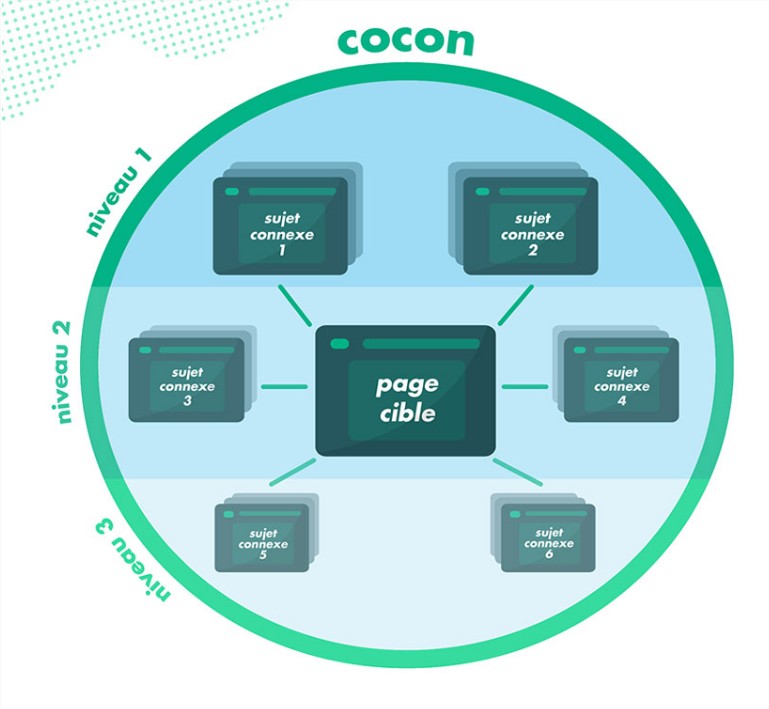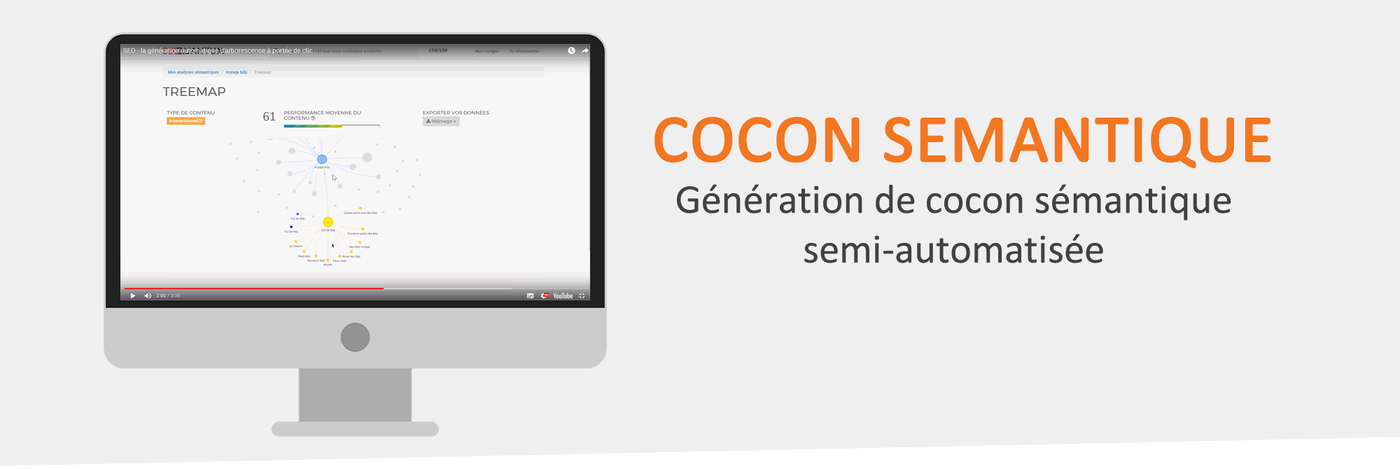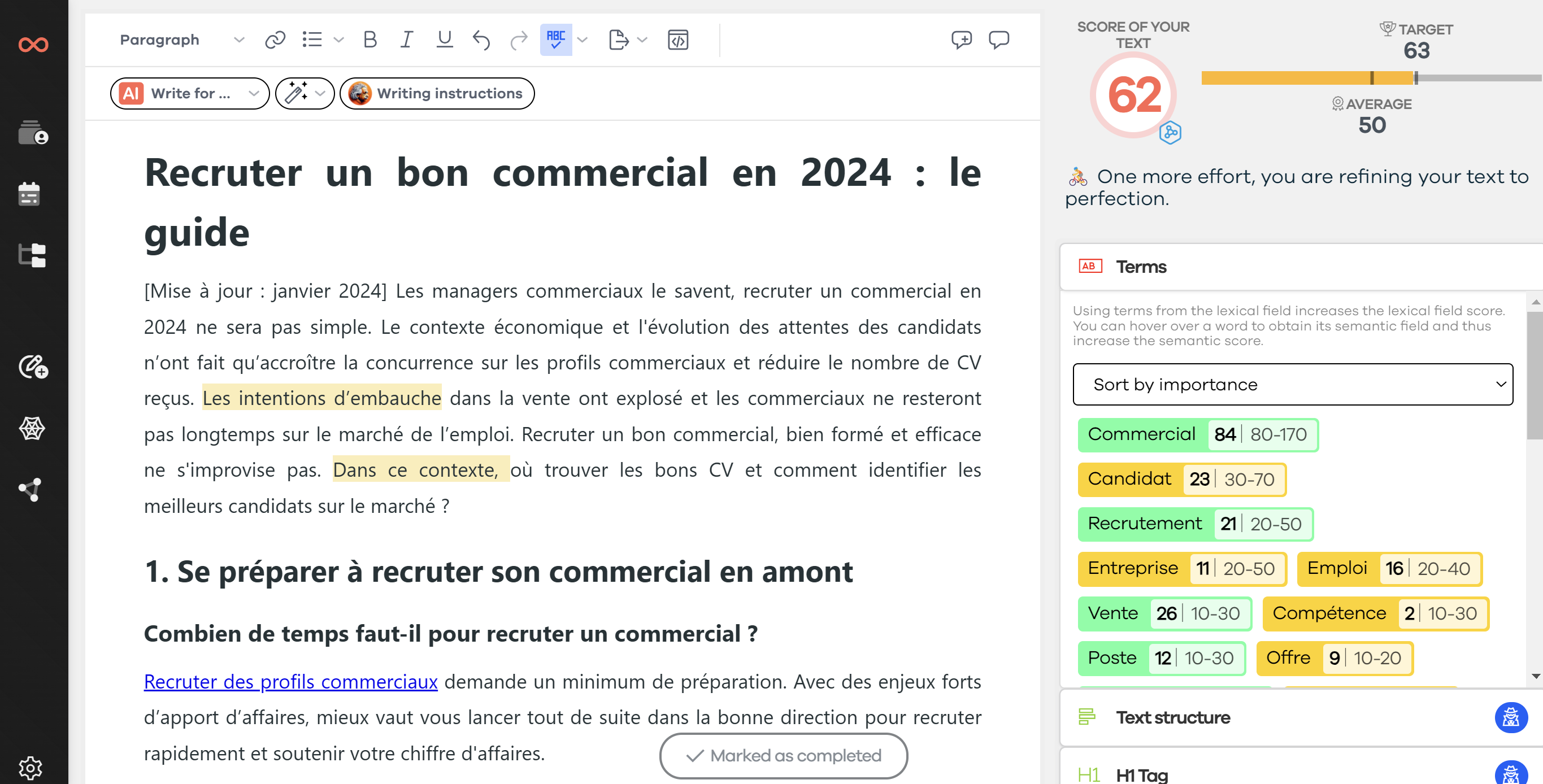🔮 A Topic Cluster: The Definition
A topic cluster is a group of web pages linked together by a precise architecture.
They are built around a page targeting a broad theme, linked to several more narrowly targeted related pages. In SEO, it is a thematic siloing strategy conceptualized by French SEO expert Laurent Bourrelly.
Does this sound complicated? It's simpler than it appears. Here's a glimpse of what a topic cluster might look like:

See the complete infographic https://www.ineolab.fr/blog/cocon-semantique-infographie-seo/
💎 Why are Topic Clusters Important?
There was a time when SEO specialists could rank by targeting a single keyword per page.
Today, targeting entire topics is the key to success. There are a few main reasons for this:
- Google's personalized search has made keyword ranking more fluid. As Google adapts search results to users, it is more difficult to calculate keyword ranking positions across the entire site.
- Search engines better understand concepts related to semantics. Indeed, Google's algorithms (like Rankbrain, Google Bert) are now more efficient at understanding when multiple terms are used.
- Google (and other search engines) want to provide users with reliable and authoritative results. One way to show your authority to people and robots is to consistently create useful and accurate content on a topic, rather than sporadic pieces targeting specific keywords.
📌 What are the Benefits of the Cluster?
The benefits of this approach are also numerous. Here are a few:
- The topic cluster increases user retention. The cluster responds to the user's search intent. If you have tons of content related to visitors' interests, they are more likely to stay (and possibly buy from you).
- When one element performs well, all linked pages also perform better. Creating content around a topic often improves the search ranking of other similar content already on your site. In some cases, this can lead to owning multiple SERP positions for a single keyword. (Yes, it's possible)
- It helps increase traffic. Thanks to better ranking, you attract more visitors. And as we've established, they're more likely to stay on the site. This creates a virtuous circle of increasing traffic and conversions.
📐 How to Create a Topic Cluster?
Are you ready to take action and create your topic cluster?
1/ Selection of Topics to Cover
Let's get serious and see how you can create topic clusters yourself.
The first step is to identify the topics that are relevant to your brand and your audience. These can be:
- Problems your audience is facing. What do your potential customers need help with?
- What you want to be known for. On what topics do you want to be the internet's leading authority?
- Things people use your products for. For what reasons do customers buy your products?
2/ Keyword Research
If we're targeting topics, does that mean keywords no longer matter?
Not at all.
Keywords are still just as important. However, when it comes to creating topic clusters, the key is to create multiple content with different keywords all revolving around a central theme.
To do this, we need to select a central theme for the content of our target page, and several related terms for the daughter pages.
Based on this quick research, we now have:
- A main query related to the service/product to promote. We plan to build a "pillar" content around this topic.
- Tons of related keywords. These are all more narrowly targeted subtopics for which we could create related pages and link them via internal linking around our main page.
Writing the Content of the Topic Cluster
You now know what topic you're going to create content around. Congratulations! You're on your way to outperforming your competitors and being recognized as the authority in your industry.
But first, you need to create this content.
So we'll start by determining what types of content you're going to produce. This could include:
- Website pages. These could be articles in a resource center or learning center.
- Blog posts. Typically, this is a base article with several linked articles.
- Microsites. An entire mini-site dedicated to a topic can be effective (if microsites are part of your strategy).
- Videos. This could be a series of videos covering all aspects of a topic.
Each item will need to be accompanied by a promotion plan to get your content known. This plan could include:
- Social campaigns. Coordinated messages across different channels can help spread your content and reinforce your message.
- Newsletter. With a very high return on investment, email promotion is a no-brainer.
- Google Ads and social media ads. Depending on the type of content you're creating (and your budget), paid promotion may make perfect sense.
We won't go into the details of content creation and writing in this article. For more information, we'll direct you to the following articles and resources: https://www.seoquantum.com/billet/guide-contenu-seo-3-points
Effective Content Structure for Strong Topic Clusters
But before you can publish all the great content you create, you need to know how you're going to structure your topic cluster. There are several ways to do this, but they all revolve around the principle of internal linking. It involves linking via internal links (HTML tag ) several content items (daughter page) around your main page (heart of the cluster).
Using topic clusters seems more complex than it actually is. If you're able to plan multiple content items around an idea, make it presentable, and link them together, then you're capable of putting this principle into practice.
A few key points before you start creating:
- Topic clusters have not replaced the need for keyword research. They have rather pushed agencies and consultants to rethink the semantic search of keywords, going beyond isolated terms and thinking more broadly about the whole topics.
- Creating multiple high-quality content items around the same topic helps establish your site's topical authority. This may seem obvious, but having multiple content items targeting different aspects of the same topic shows people and robots that you are a useful resource. This leads to an increase in rankings, traffic, and conversions.
- It's not difficult to implement. Of course, creating multiple long content items will take time. The same goes for all planning and research phases. But, if you were to create multiple items in the long run, why not build them around a single topic, and completely own the content on the web?
🛠 Tools for Topic Clusters
There are many tools (free or paid) to help you in the development of a topic cluster. They can be divided into two main categories of software:
- Keyword research tools
- Cluster visualization tools
For keyword research for your clusters, we recommend:
- Rankxplorer
- Yooda Insight
- Ahrefs
- SEMRush
For structure and cluster visualization tools:
- Oncrawl
- ScreamingFrog
- SEOQuantum (Crawl and cluster tool)
Save Time by Semi-Automatically Creating Your Own Topic Cluster
Lacking inspiration? SEOQuantum uses its deeplearning engine to determine the semantic relationships that link the different topics of a theme (future internal linking of the topic cluster). It's a good alternative to the "manual" cluster and saves you time with this cluster generation software.
For more explanations, watch the video below that explains how the tool works:
Need to go further?
If you need to delve deeper into the topic, the editorial team recommends the following 5 contents:

